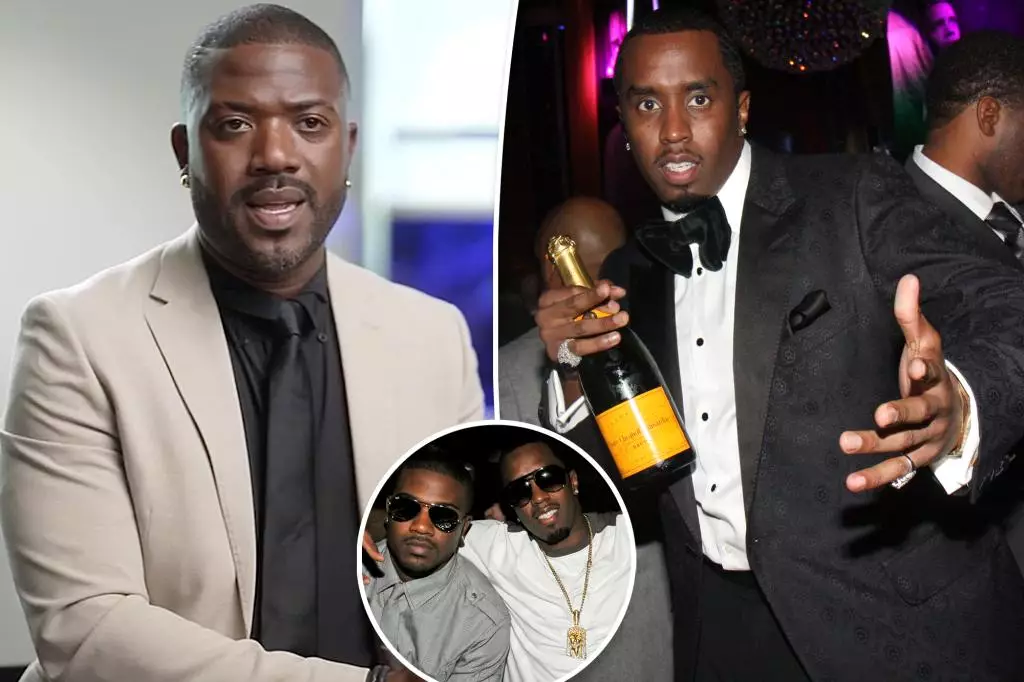The entertainment industry is often a shimmering facade, concealing tumultuous stories beneath its glamorous surface. Recently, a conversation between Ray J and TMZ’s Harvey Levin has shed light on allegations surrounding Sean “Diddy” Combs, revealing the unsettling dynamics present in Hollywood’s upper echelon. Ray J’s assertions bring to the forefront the persistent theme of power dynamics, systemic silence, and the idea of complicity that pervades the careers of many high-profile individuals.
During a candid conversation with Harvey Levin for the documentary “The Downfall of Diddy: Inside the Freak-Offs,” Ray J referred to the troubling culture of secrecy that sometimes envelops the lives of the rich and influential. He suggested that many public figures are leveraging their victim stories to divert attention from their associations with Diddy amid mounting legal troubles. The singer alleged that “catch and kill” tactics—wherein individuals are paid to stay silent about damaging information—are commonplace, insinuating a darker underbelly to celebrity interactions.
Ray J’s claims suggest that some in the industry may feel compelled to stay quiet, resulting in a culture of unspoken truths where financial incentives undermine accountability. He spoke of A-listers who allegedly approach him in confidence, eager to share their experiences related to Combs but hesitant to publicly disclose their tales. This notion of “trust” raises questions about the system that fosters such a precarious web of silence.
Ray J’s hesitance to elaborate on the specific incidents involving Combs was telling. His cautiousness to disclose details of high-profile people’s experiences with Diddy points to a greater issue within the industry—a fear of reprisals and backlash. When asked directly about whether these unnamed individuals wish to keep their stories under wraps due to Diddy’s influence, Ray J affirmatively responded, highlighting a disturbing reality that many within his orbit understand: crossing Diddy could have severe consequences.
The emotional toll of silence is significant, and the reluctance of victims to speak openly may stem from several factors, including reputational damage, fear of losing career opportunities, or worse, alienation from an industry hierarchy that often punishes dissent. Ray J alluded to this distress when he said, “I don’t know why I just said it, but I said it.” This confession about how undesired truths linger in the shadows of Hollywood encapsulates a broader concern about the pressures that celebrities face when navigating public and private identities.
Sean “Diddy” Combs currently faces a storm of legal challenges, including sex trafficking and racketeering accusations. As prominent figures like Texas-based attorney Tony Buzbee vowed to bring forth the names of enablers and other celebrities who facilitated Combs’ alleged misconduct, the gravity of these allegations presents an existential threat not just to Diddy but also to the overarching fabric of celebrity culture. Buzbee’s insistence on meticulous diligence before releasing names reflects a serious endeavor to ensure that the revelations have a substantial basis in fact.
The murky nature of Combs’ infamous parties, rumored to take a turn into unsavory territory, further complicates the narrative. It raises essential questions about consent, complicity, and the normalization of toxic behavior in elite social settings. As stories emerge, they encourage conversations about accountability, where the complicity of bystanders—including fellow celebrities—comes under scrutiny.
While Diddy’s legal entanglements mount, the intricate connections between fame and personal relationships come into full view. Insiders, like Ray J, find themselves in conflict—navigating their identities as both participants and observers in an industry where secrets abound. The recent altercation at a Halloween party involving Diddy’s children and Ray J illustrates the fragmented relationships that often form against a backdrop of public persona and private disputes.
As the entertainment world watches this situation unfold, the tension between fame and accountability becomes increasingly palpable. Ultimately, Ray J’s revelations and the ensuing fallout ask essential questions about the nature of truth, the burdens of fame, and the hidden narratives that remain tucked behind closed curtains. Where will the breaking points for victims, facilitators, and bystanders lie as this story continues to develop? The answers may not only reshape individual careers but could fundamentally alter the landscape of celebrity culture itself.
